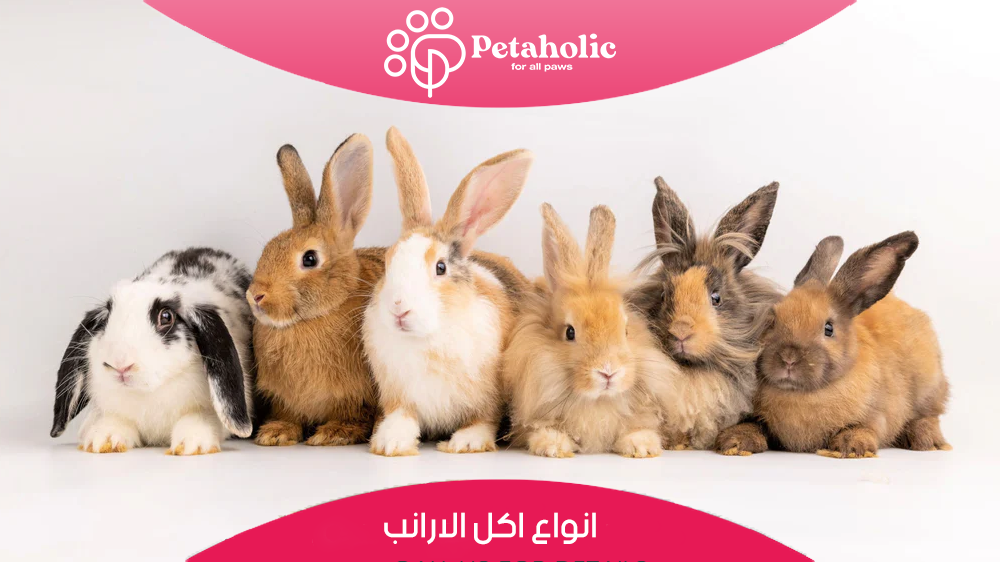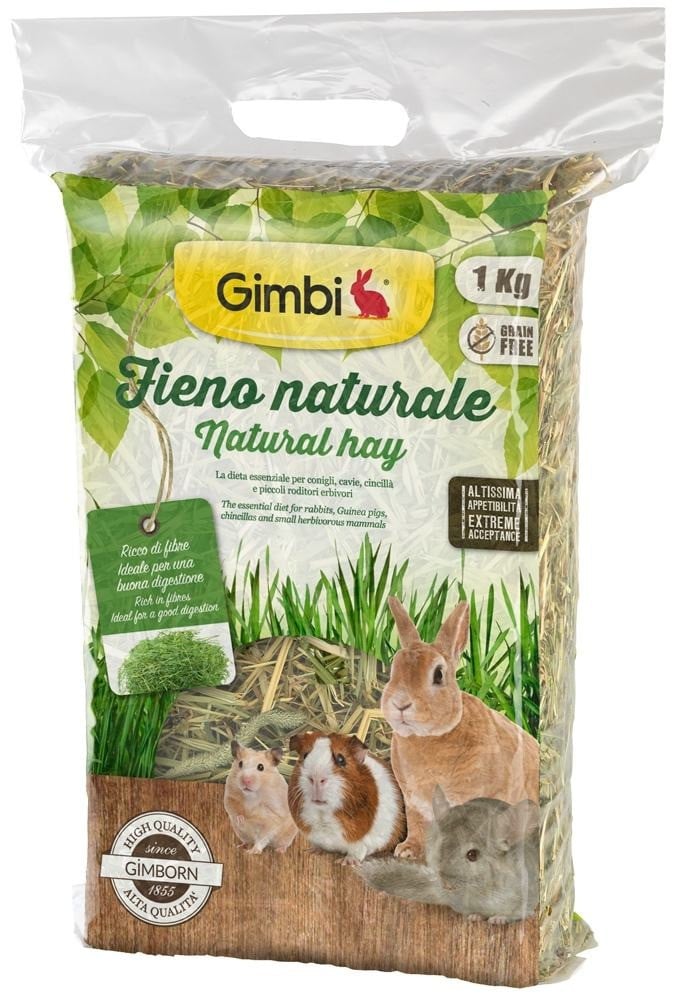
What should pet rabbits eat? A good rabbit diet needs more than just carrots and lettuce. Rabbits require a balanced diet of hay, fresh vegetables and fruit, and a few pellets. However, it is important to note that rabbits have sensitive digestive tracts, so the transition to a new diet should be done gradually to allow their system to adapt. In this guide, you will learn the best types of rabbit food and how to make a properly balanced diet for them. You will also find in our store all healthy and delicious rabbit foods at affordable prices.
What types of rabbit food make up the best diet for them?
Here are the best types of rabbit food:
1.Hay or fresh grass: the main component of the rabbit’s diet
Rabbits should get a good amount of fresh hay or grass daily on a consistent basis so that it is the largest staple of their diet (about 80% of the diet). Fresh hay or grass provides dietary fiber that is essential for your rabbit's digestive health, while also helping to trim your rabbit's teeth. You'll find that there are many types of hay available for rabbits, but the best options for rabbit hay include Timothy, meadow and orchid hay. Other suitable options are wheat or pasture hay.
Many rabbits will enjoy eating a mixture of these hay types if you can provide them. Alfalfa hay is also good for young rabbits that are still growing and under about 7 months old; This is because they need protein and extra calcium. However, alfalfa hay is not recommended for adult rabbits. Grass is the most natural food that rabbits will eat, but it should be introduced gradually into your rabbit's diet if it is not accustomed to eating it.
Among the best types of nutritious and healthy hay that we recommend for rabbits from Betaholic for a complete and balanced diet:
2. Fresh vegetables are one of the best types of food for rabbits
Rabbits should be given a daily supply of fresh vegetables and herbs at 10% to 20% of their overall diet. Examples of leafy vegetables include lettuce, mint, parsley, and cilantro. Other vegetables that can be fed to your rabbit twice a week include broccoli, celery, carrots, and cabbage. You must also make sure that the vegetables are free of pesticides, as they may be harmful to the rabbit. Also, do not feed your rabbit any spoiled, wilted, or moldy vegetables or herbs. If they are not suitable for you to eat, they are not suitable for your rabbit either.
As for spinach, it contains a lot of vitamins and nutrients, and rabbits should only eat it in small quantities because it contains high levels of oxalate which can obstruct a rabbit's urinary tract and cause itchy skin or mouth if eaten in large quantities. As for cucumber, rabbits can safely eat its flesh, peel, and roots in small quantities. Just give your rabbit a few small pieces at a time. Cucumber contains few nutrients and a high percentage of water. Therefore, it may cause diarrhea if consumed in excess.
3. Fresh fruits
You can give fruit to rabbits as a delicious, healthy treat, but only in small quantities due to the sugar content. This can include strawberries, raspberries, bananas, pineapples, and apples (seedless). You can use your rabbit's favorite humor for training purposes in small amounts. As for grapes, adult rabbits can only eat one or two from time to time as a reward. However, they should not be fed grapes regularly due to their high sugar and water content; Which may cause obesity and intestinal disorder.
Your rabbit may like to eat a lot of fruit for its delicious taste, but limit this type of food to only once or twice a week, and keep the daily portion size small. You can serve one grape cut in half, a small slice of banana, and a small cube of apple or carrot.
4.Commercial pellets
Rabbit pellets can be fed to your rabbit in moderation, but should only be given as a supplement to their diet, not the main component of the diet as they are high in energy, and a pellet-based diet is like eating energy bars at every meal. The percentage of pellets in the rabbit's diet should also decrease as it grows older. Alfalfa pellets are good for baby rabbits under 7 months old.
Some rabbits suffer from chronic intermittent diarrhea or constipation, and many are overweight from a diet of primarily pellets rather than hay. Uncontrolled feeding of pellets to rabbits can also lead to obesity, heart and liver disease, chronic diarrhea and kidney disease due to the high concentration of calories, low fiber and high calcium levels in the pellets.
Think of pellets as nutritional supplements that provide a more concentrated amount of vitamins and minerals than rabbits find in hay and vegetables alone. Avoid pellets that contain seeds or fatty grains such as wheat or corn, as these products are very high in sugar and carbohydrates, leading to long-term health problems.
5. Fresh water
Your rabbit will need plenty of clean, fresh water at all times. You can use a Betaholic water dispenser bowl or bottle. The pot must also be cleaned and the water changed daily. We recommend using a large water bowl because it is easier for rabbits to tip over the bowl or toss lighter bowls, but a large bowl will help prevent spills.
Rabbits drink a surprisingly large amount of water. They should drink the amount of water a small dog drinks per day because they only excrete about 1 to 2 cups of water per day. But, of course, the amount of water your rabbit drinks will vary depending on a number of factors.
Larger rabbits will drink more water, as will pregnant rabbits. Rabbits are also more likely to drink more in the hotter months of the year, or if the rabbits are very active.
What food is harmful to rabbits?
Rabbits are herbivores, feeding mainly on grasses and vegetables. However, there are some foods that should be avoided to give rabbits to avoid any health problems. Here are some foods that it is best to avoid giving to rabbits:
1. Sweets and chocolate: You should avoid giving sweets and chocolate to rabbits, as they can cause serious health problems.
2. Excess grains: Grains should only be served in moderation, as large amounts can lead to digestive problems.
3 . Fatty foods: It is preferable to avoid foods with a high percentage of fat, which can lead to health problems such as obesity.
4. Legumes : Some legumes may cause digestive problems for rabbits, so it is preferable to avoid giving them in large quantities.
5. Unsuitable human food: You should avoid giving rabbits any food that contains excess salt or spices.
6. Toxic foods: You should avoid any type of food that can be toxic to rabbits, such as some plants and herbs.
Anyone keeping rabbits should ensure they provide a healthy, balanced diet that reflects the needs of the rabbit and ensures its health.
How often should rabbits be fed?
The frequency of feeding rabbits depends on several factors, including the size of the rabbit, the type of food provided, as well as its life stage (such as growth or pregnancy). Here are some general guidelines:
1. Adult rabbits: It is preferable to feed adult rabbits once to twice a day. Specific amounts of herbs, green leafy vegetables, and grasses can be provided. Moderate amounts of seeds and grains can also be offered.
2. Young rabbits (baby rabbits or newborn rabbits): Young rabbits need more frequent feeding, and food can be offered to them throughout the day. Young rabbits are provided with special food that contains the nutrients necessary for their proper growth.
3. Weight control: The rabbit’s weight must be monitored and the amount of food adjusted accordingly. Obesity is a health problem for rabbits, so appropriate amounts must be provided to maintain their healthy weight.
4. Pregnancy and breastfeeding: During the period of pregnancy and breastfeeding, the female rabbit needs additional amounts of food to meet her needs and the needs of her young.
Does rabbit eat clover?
Yes, rabbits eat alfalfa and it is one of the common herbs given to rabbits. Alfalfa is a type of plant that belongs to the clove family, and it is rich in fiber and vitamins. Alfalfa is a good source of nutrition for rabbits and contains a lot of green fiber which helps support the rabbit's digestive system.
Alfalfa can be given to rabbits fresh or dried, but it is preferable to wash it well before serving it to reduce impurities and dirt. Alfalfa can be part of a varied diet that includes other grasses, vegetables, and grasses.
However, alfalfa should only be part of a balanced diet and effectively supplemented with other nutritional components. Alfalfa is best combined with a variety of other sources of nutrients, such as grains, vegetables and other grasses, to ensure that the overall nutritional needs of rabbits are met.
What foods are strictly prohibited for rabbits to eat?
1.Avocado
Although an excellent, healthy snack for humans, avocados contain a compound called persin, which can be dangerously toxic to rabbits. This compound is found in all parts of the avocado. If a rabbit consumes toxic levels of persin, it can cause behavioral abnormalities, difficulty breathing, and, if not treated properly, can lead to congestive heart failure, which can be fatal.
2.Chocolate
As with many other members of the animal kingdom, chocolate is highly toxic to animals. Chocolate contains theobromine and caffeine, both of which can be very harmful to our furry friends. The darker the chocolate, the greater the risk of poisoning. Signs of chocolate toxicity include diarrhea, restlessness, hyperactivity, trembling, panting, writhing or difficulty feeling comfortable, tachycardia, and high temperatures. It can also be fatal if these symptoms are not treated quickly.
3.Fruit seeds
Make sure to remove all seeds and pits from all types of rabbit food before offering them fruit. While feeding small amounts of the pulp of many fruits is perfectly safe, the seeds and pits of many fruit varieties contain trace amounts of cyanide. Apples and pears are the most famous examples, but apricot pits, peaches, mangoes and cherries also contain cyanide. While the amount of cyanide found in fruit seeds is generally minimal, it is best to avoid feeding them to rabbits altogether.
Among the delicious treats that we advise you to offer your rabbit to provide a fun, delicious and healthy snack away from harmful types of rabbit food:
Now, I'm more familiar with Types of rabbit food from Petaholic so that you can create a balanced diet that contains all the nutritious and beneficial foods that your rabbit loves. You can also get the best commercial rabbit foods from our store with the highest quality and the best prices.
You may also be interested in:
- What do small rabbits eat and how to feed them?
- The basics of caring for rabbits and how to take care of them



